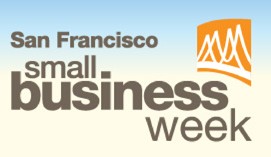As part of the lead-up to the eighth annual San Francisco Small Business Week (May 13-18, 2013), I was interviewed for the San Francisco Small Business Week blog.

The week is designed to offer a series of educational and networking events to educate, connect and celebrate the small business community in San Francisco. This year’s festivities will include a conference with 50 free workshops and seminars for small business owners (I’ll be speaking about business planning), a gala called Flavors of San Francisco, and an awards ceremony hosted by the Small Business Commission, the Mayor’s Office and the Board of Supervisors to recognize exceptional small businesses from each district and city-wide.
Here’s my interview with Small Business Week…
SMALL BUSINESS WISDOM FROM PAUL TERRY
Small businesses in San Francisco have a wealth of opportunities to access wisdom and technical assistance from a variety of small business experts who provide one-on-one counseling, technical assistance, and instruction through neighborhood and community-based nonprofit agencies. The San Francisco Small Business Week Committee is pleased to share wisdom from these experts who help the small businesses that shape our communities to succeed.
Today we hear from Paul Terry, business planning coordinator at Renaissance Entrepreneurship Center, who believes that one of the keys to success is making a life-long commitment to education.
What role do you play in supporting San Francisco’s small businesses?
I’ve supported small businesses for more than 25 years as an independent business consultant and owner of Paul Terry & Associates with skills that I developed from launching my own food, distribution and training businesses in San Francisco. I am also the business planning coordinator and primary instructor at the Renaissance Entrepreneurship Center. I was one of the initial developers of Renaissance Entrepreneurship Center’s entrepreneurship program, business incubator, and business support program.
The role I play in supporting small businesses involves teaching, empowering, and encouraging entrepreneurs to start and grow businesses. The training and consulting helps people build their confidence and access the resources they need to be successful in business.
As a small business consultant in private practice, I work with 25-30 businesses each year to facilitate growth and transition, to build effective partnerships, and to implement strategic planning solutions. Over the years, I’ve taught 7,500 entrepreneurs, and I’ve supported over 600 small businesses.
In your years of working with entrepreneurs, what has emerged as the greatest challenge to a small businesses success?
One of the biggest challenges relates to maintaining balance. New business owners need to recognize that their entrepreneurial skills – their ability to get the business up and running – need to be in line with the complexity of the business model. They need to hone their skills, tap into their confidence and develop the scale of business that makes sense for who they are at a particular time. New skills are then required on an ongoing basis as the business grows in size and complexity.
Another challenge facing new businesses involves joint ventures and business partnerships. If the business partners fail to clearly define the relationship at the early stages, problems quickly emerge and often create disruptive conditions as the business grows.
A third challenge for a new business occurs when the entrepreneur attempts to transition from a full-time job — working for someone else — to working in a business that is not immediately profitable. People need to be realistic about the appropriate amount of capital they need launch and grow to profitability.
The common thread – and the reason people come to me – is that they are stuck. They need a better framework for making educated decisions and they need access to the appropriate mentors, advisors and associates for advice and direction.
In your experience, what is the biggest key to long-term success for a small business?
Businesses that have been around for a long time survive and thrive because they provide very good services to established clientele with fair terms and conditions. Long-term success also requires being nimble enough to adapt to new markets, emerging trends, and new technologies.
There are macro and micro competitive forces that can undo a successful business. It is key to make a life-long commitment to education, strategic thinking, and new skills development.
What are some of the most important ways in which small businesses shape communities in San Francisco?
Small businesses define the character of our neighborhoods in San Francisco. The appropriate mix of small businesses enriches and energizes a particular area, which attracts tourism and inspires residents to shop locally. Small businesses invest in their communities by hiring locally, engaging in local politics, donating to nonprofits, building parklets and other community spaces, and doing all the critical things that make our neighborhoods more enjoyable. Small businesses are the advocates of local development and define the flavor and culture of this city – with “pop-ups”, food trucks, trunk shows and an involvement in the local areas where they live, work and play.
Leave a Reply